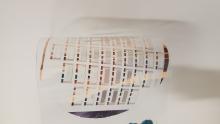
The development of new electronic or sensor components for integration into electronic circuits is a central research focus of the Flexible Devices group, with the aim of being able to implement smart systems flexibly, e.g. for geometry-adaptive sensors or wearables.
In close cooperation with the Fraunhofer Institute for Electronic Nano Systems ENAS and the Nanosenors group, this includes the development of ultra-thin, flexible chemical sensors on free-standing parylene as a substrate, with a flexible pH sensor and a flexible sensor for volatile organic compounds (VOC) being examples. This work complements the research focus of developing a circuit board technology based on parylene for the realization of ultra-thin, highly flexible and biocompatible electronic or sensor systems.
Another research focus of the Flexible Devices group is the development of microsystems (MEMS), i.e. highly miniaturized systems with movable mechanical components in the submillimeter range. To create high-performance microsystems, flexible materials such as parylene are integrated in order to develop new and improved biological sensors, for example in cooperation with the Biosensors group through additional functionalization with biomolecules. The development of micro-optical systems (MOEMS), in which we are involved in close cooperation with several international partners, also falls within this research focus.
